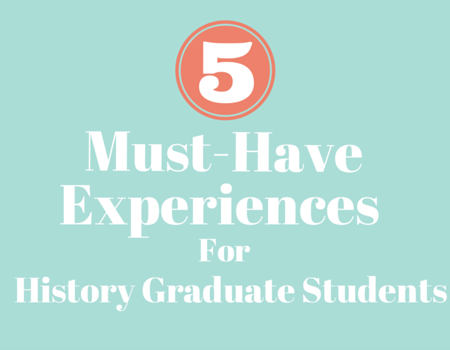 If you enrolled in graduate school today, what courses would you take?
What experiences would you make sure you had before you graduated?
If you enrolled in graduate school today, what courses would you take?
What experiences would you make sure you had before you graduated?
For the last few weeks I have been reflecting on theses questions.
A prospective graduate student asked me to lunch to learn more about my grad school experiences. He wanted advice about how to apply, what courses he should take, and what experiences he should have while in graduate school.
I gave him advice about what I would do if I enrolled in graduate school today. The advice amounted to five different courses or experiences.
In this post you will learn about the what I think are the five must-have experiences for a history graduate student today.
Disclaimer
I would like to note that I had a fantastic graduate school experience.
I enrolled in a funded program that was focused on collaboration. I also worked with an advisor who took the time to teach me how to write, teach, research, and apply for funding.
My advice does not stem from any deficiencies in my program, but from how technology and the economy have changed over the last decade.
5 Must-Have Courses & Experiences
In my opinion, these are 5 experiences that history graduate students should strive to have while in graduate school.
1. Keep an Open Mind to Non-Academic History Careers
I wish I had kept an open mind to non-academic history careers while in graduate school.
As a grad student, I thought I wanted to be a professor and I had rather strong feelings about an academic career path.
I had entered graduate school with a bit of public history experience; I spent five summers working as an interpretive ranger for the National Park Service in Boston. I respected the work of public historians, but I had decided I wanted to do more research and writing than many public historians get the opportunity to do.
 I attended talks by the public historians my department occasionally brought in, but during each talk I told myself that I wanted to research and write more. I wanted to be like my advisor, someone who conducts serious scholarly work and then volunteers his time to bring that work to public history institutions.
I attended talks by the public historians my department occasionally brought in, but during each talk I told myself that I wanted to research and write more. I wanted to be like my advisor, someone who conducts serious scholarly work and then volunteers his time to bring that work to public history institutions.
The funny part about my young, naive view: By the end of my fourth year I began having doubts about working as an academic.
In fact, my extracurricular activities suggested that I might be better suited to a career in public history. My frequent presence in the archives led me to volunteer at a couple of the historical societies and museums where I researched.
Even with my volunteer work and doubts, I clung to the idea of an academic career.
My close mindedness prevented me from seeking internships and volunteer opportunities that could have helped me land a public history job.
When I finally admitted that I did not want to be a traditional academic (ca. 2011/2012), I had missed my opportunity to prepare for the public history job market.
The public history job market is just as competitive as the academic job market and, despite what many professors had told me, most public history institutions do not want to hire traditionally-trained historians.
What type of historian do they want?
My experience has been that public history institutions want candidates with experience in creating digital exhibits, some background in nonprofit management and donor cultivation, and experience, or at least knowledge, of how to apply for institutional grants. The ability to do traditional historical work, i.e. research, writing, analysis, and interpretation, is a bonus.
This realization leads me to recommend the next two graduate school experiences.
2. Find an Internship in Non-Profit Development
Graduate students have a lot of work, but I wish I had found a way to intern in the business or development office of a nonprofit.
An internship in a nonprofit development office would have allowed me to enhance and develop skills in donor cultivation, customer service, accounting, and applying for institutional grants. These are transferrable skills that would allow anyone who had them to compete for jobs with nonprofit organizations as well as for positions within in big corporations or small businesses. These skills would also come in handy for any historian who wants to start their own business.
 3. Take a Digital Humanities Course or Seek an Internship with a DH Project
3. Take a Digital Humanities Course or Seek an Internship with a DH Project
Digital humanities is the way of the future.
DH projects vary from helping scholars make sense of large amounts of data to websites that make history more accessible to non-specialized audiences.
Digital humanists perform important work.
Experience in DH helps historians become better and more well-rounded scholars. In my experience, digital humanists have a knack for looking at data and the ways scholars can contextualize it in ways that differ from non-digital humanists.
Additionally, many DH projects lend themselves well to acquiring new and transferrable skills in computers and technology; skills historians can use to apply for different types of academic and non-academic work.
4. Develop Social Media Skills
Today, I blog, tweet, and hold conversations on Google+. However, I did not develop a fluency in social media until after graduate school.
If I enrolled in graduate school today, I would devote a bit of time to developing social media skills.
Why?
3 Reasons:
1. Social media makes scholars more productive.
Historians who blog tend to write more than scholars who don’t blog.
Blogging also helps scholars think through and develop their ideas. The act also helps them develop a regular writing practice.
Many of us take thinking and writing for granted, but they are skills that get better and sharper the more we do them.
If I were to enroll in graduate school today, I would look into forming or joining a group blog like The Junto. Group blogs provide all of the benefits of blogging, but spread out the work of blog maintenance.
 2. Social media makes scholars more collaborative.
2. Social media makes scholars more collaborative.
Whether you blog about an idea for your dissertation or tweet a question about a source, other scholars will find you and help you develop your ideas or find the source you seek.
Of course, being a social and collaborative process, you will get as much out of social media as you put into it. The more you converse with and help other scholars with their questions or ideas, the more you will benefit from scholars commenting on your work.
3. Social media will help you build your platform.
Being an active blogger, Facebook poster, or tweeter will help raise your profile among others who share your interests.
Social media can help you position yourself as a thought leader in your field or subfield.
Opportunities come to thought leaders by way of jobs, interview requests (which will enhance and raise your profile more), speaking opportunities, and possibly even book deals.
At the very least, social media can help you develop a following that will help you get a book contract; followings mean that you can market your books to hundreds, if not thousands, of potential book buyers.
5. Attend More Conferences
Conferences provide opportunities to network with other scholars and to learn about new scholarship.
Conferences can be expensive, but they provide invaluable networking opportunities. Attending a conference may help you find an outside member for your dissertation committee, a potential reference for a job, grant, or internship opportunity, or a possible project collaborator.
Conclusion
The job market has changed a lot in the ten years since I enrolled in graduate school. My Five Must-Have Experiences are based on my graduate school and post-graduate school experiences.
 What Do You Think?
What Do You Think?
If you were to enroll in graduate school today, what courses would you look to take or experiences would you look to have?
If you are enrolled in graduate school today, what course are you looking to take and what experiences would you like to have?
